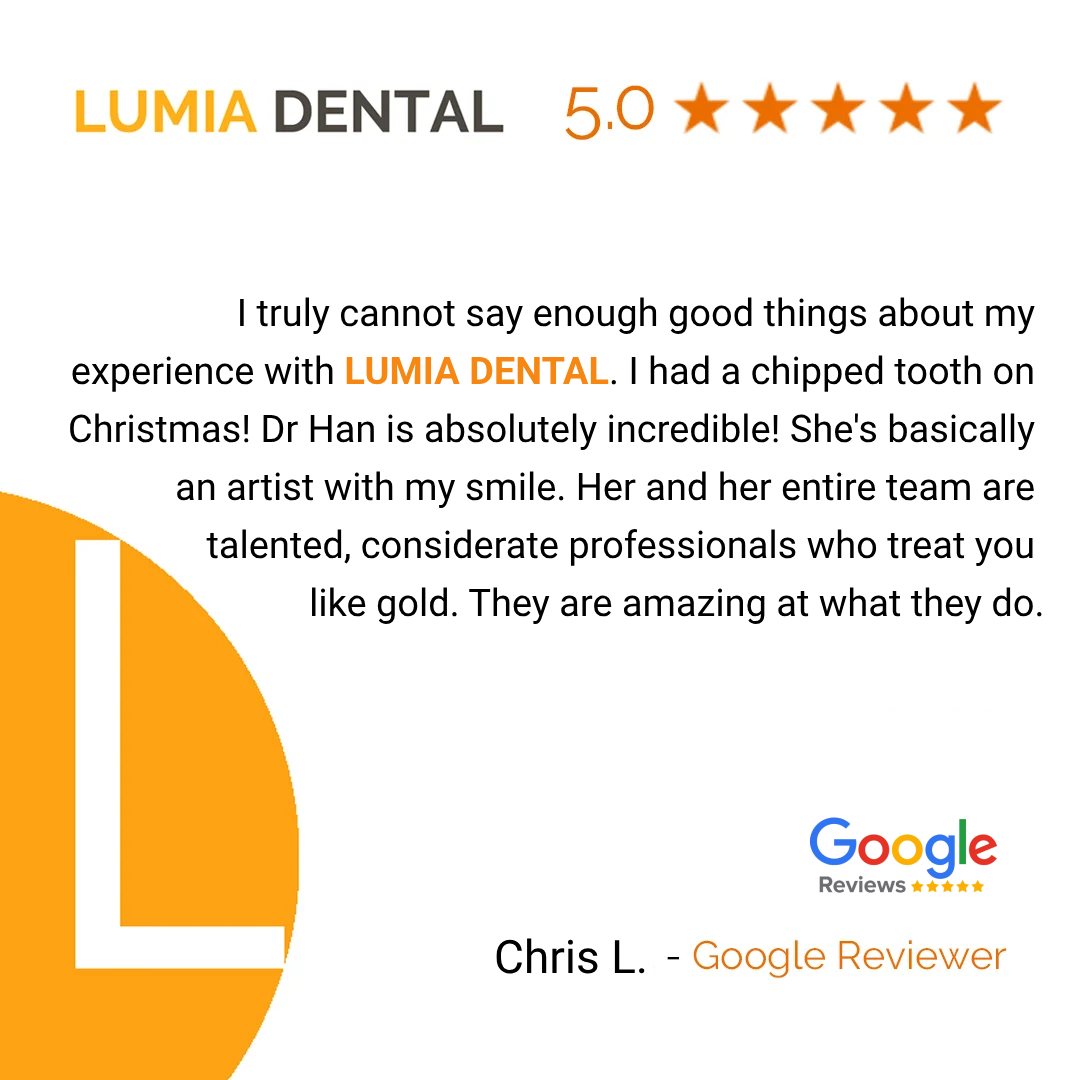
NEW YORK CITY'S
Healthy teeth and healthy gums start as a base to improve the look of your teeth, the way you feel about your teeth, and most importantly, the way you feel about yourself and your smile. Imagine what a transformation a more confident smile can make for you!
Cosmetic dentistry does not mean big, white teeth; it should never mean that. Everybody has a different face shape, different body type, different jaw shape, different lip form, different facial muscles, different size of gums… there are so many factors in building the ideal, healthy smile for you. The happier, healthier you. Your LUMIA DENTAL cosmetic dentist will discuss with you your needs and your expectations - what will make you happy about yourself and your smile - and determine what is right for you.
Our LUMIA DENTAL cosmetic dentists are trained and experienced in conservative cosmetic dentistry, working with what canvas you bring us, to produce stunning results.






OUR SERVICES
SEE WHERE WE HAVE BEEN MENTIONED
At the New York Center for Cosmetic Dentistry, we are proud of all the praise we have received over the years. Dr. Adam Goodman established the foundation of quality cosmetic dentistry in New York and Dr. Sharah is continuing in the same fashion.

SEE HOW WE HELPED OUR PATIENTS
Check out our Smile Gallery! Our gallery showcases before and after patient photos, describing procedures for each case. Learn more about how our bonding, porcelain veneers, crowns, Invisalign, and teeth whitening services have created beautiful smiles!
Whether cosmetic dental work is covered by your dental insurance depends on the specific coverage and policy of your insurance provider. It’s always best to review the details of your dental insurance policy with one of our treatment coordinators to determine what procedures are covered and to what extent.
Typically, cosmetic procedures are often considered elective and not covered by dental insurance. However, dental insurance is much like a discount plan – even if the procedure is not covered, the dental office is obligated to take the insurance contracted rate, which is a significantly reduced fee.
Crowns and veneers are both dental restorations that are used to rebuild lost tooth structure, protect the tooth structure inside, and improve the shape/shade of the tooth.
A dental crown, also known as a cap, is a restoration that covers the entire visible portion of a damaged or decayed tooth. It's usually made of porcelain, ceramic, or metal and is designed to protect the remaining tooth structure, restore the tooth's shape, size, and function, and improve its appearance. Crowns are typically recommended for teeth that are extensively damaged, decayed, or weakened, and they may also be used to cover dental implants or to anchor a dental bridge.
A dental veneer, on the other hand, is a thin shell of porcelain that is bonded to the front surface of a tooth to improve its appearance. Veneers are primarily used to correct cosmetic issues, such as discoloration, stains, chips, cracks, gaps, or misshapen teeth. Veneers are a more conservative option than crowns, as they preserve more of the natural tooth structure. They are also more durable and stain-resistant than bonding.
In summary, while both crowns and veneers can improve the appearance of teeth, crowns are more extensive restorations that cover the entire tooth and are primarily used to protect and strengthen damaged teeth, while veneers are more conservative and are used primarily for cosmetic enhancements. Your LUMIA DENTAL cosmetic dentist can help you determine which restoration is best for your individual needs and goals.
The lifespan of veneers varies depending on a variety of factors, such as the quality of the materials used, the skill of the dentist, and how well the veneers are cared for by the patient.
Typical longevity ranges from 10 to 15 years. To ensure the longevity of your veneers, it's essential to maintain good oral hygiene practices, such as brushing twice a day with a fluoride toothpaste, flossing nightly, and visiting your dentist for regular cleanings and check-ups. It's also important to avoid habits that can damage your veneers, such as biting on hard objects or using your teeth as tools, and to wear a mouthguard if you engage in contact sports or teeth grinding/clenching. It's important to contact your dentist as soon as possible to address any issues and prevent further damage.
Excellent oral hygiene, patient compliance, and regular dental check-ups are necessary to prolong the longevity of your porcelain veneers.
In order to place veneers, a small amount of tooth enamel typically needs to be reduced. While the amount of reduction is usually minimal, and it varies depending on the specific case. For example, if there are gaps between the teeth, and the porcelain veneers will be used to close these gaps, the tooth reduction is very minimal.
Your LUMIA DENTAL cosmetic dentist will evaluate your specific situation and discuss the case with you before beginning the porcelain veneer procedure.
The lifespan of a cosmetic bonding, also known as dental bonding or composite bonding, can vary depending on several factors, similar to the that of porcelain veneers. On average, a dental bonding is last several years.
The longevity of a cosmetic bonding is influenced by factors such as:
It's important to note that dental bonding is not as durable or long-lasting as other restorative options like porcelain veneers or crowns. Over time, the bonding material may chip, stain, or wear down, requiring repair or replacement. Regular dental check-ups will allow your dentist to monitor the condition of the bonding and address any concerns.
Ultimately, the lifespan of dental bonding can vary from person to person, and it's best to consult with your LUMIA DENTAL dentist for an assessment of your specific case and to discuss the expected longevity of the bonding treatment.
Bondings and veneers are both cosmetic dental treatments that can improve the appearance of your teeth, but they have some differences in terms of their durability, appearance, and the extent of the corrections they can make.
A cosmetic bonding uses a tooth-colored resin material that is applied to the tooth and sculpted to improve the shape or color of the tooth. This is a conservative treatment that is typically completed in one visit, does not require any tooth numbing, and does not require any tooth reduction or enamel removal. Bondings can be used to correct minor cosmetic issues such as small chips, cracks, gaps, and discoloration.
Veneers, on the other hand, are thin, custom-made shells made of porcelain or that are bonded to the front surface of the tooth. Veneers require some amount (typically minimal) of tooth reduction while bondings do not, and the process usually takes two or more visits to complete. Veneers can be used to correct more significant cosmetic issues, such as larger chips, severe discoloration, misshapen teeth, and gaps between teeth.
While cosmetic bondings can be a more affordable and quicker option than veneers, it has some limitations in terms of its durability and long-term effectiveness. Bonding material is not as strong or long-lasting as porcelain veneers, and it may need to be replaced more frequently.
Additionally, bonding material is more prone to staining and discoloration than veneers, and it can be more challenging to achieve a natural-looking result with bonding. Porcelain veneers, on the other hand, offer a more natural and aesthetic result, and they are more resistant to staining and discoloration.
In summary, cosmetic bondings and porcelain veneers are both viable options for improving the appearance of your teeth, but they have some differences in terms of their durability, appearance, and the extent of the corrections they can make. Your LUMIA DENTAL cosmetic dentist can evaluate your specific case and recommend the best treatment option for your needs and goals.
The duration of Invisalign treatment depends on the complexity of your case and the amount of tooth movement required to achieve the desired outcome. On average, Invisalign treatment can take anywhere from 6 to 18 months, with most cases being completed within 12 months.
During your initial consultation, your dentist or orthodontist will evaluate your teeth and determine if Invisalign is an appropriate treatment option for you. They will then create a customized treatment plan that outlines the expected duration of the treatment and the specific steps involved.
The length of your Invisalign treatment will depend on several factors, including:
It's important to note that every case is unique, and the duration of your Invisalign treatment may vary. Your LUMIA DENTAL orthodontist or cosmetic dentist can give you a more accurate estimate of the duration of your treatment after evaluating your specific case.
The duration of Invisalign treatment and traditional braces can vary depending on the individual case and the specific orthodontic needs of the patient. In general, the length of treatment with Invisalign is often comparable to that of traditional braces, and in some cases, it may be slightly shorter.
Both Invisalign and braces are designed to gradually move the teeth into their desired positions. The length of treatment will depend on factors such as the complexity of the orthodontic issues, the amount of tooth movement required, the patient's age, and their compliance with treatment.
In some cases, Invisalign may offer faster treatment times compared to traditional braces. This is because Invisalign aligners are custom-made using computer-aided design and manufacturing techniques, which allows for precise planning and control of tooth movement. Additionally, Invisalign aligners are typically changed every week, which can contribute to efficient progress.
However, it's important to note that the duration of treatment can vary significantly depending on the specific needs of the patient. Some complex cases may require a longer treatment duration, regardless of whether Invisalign or traditional braces are used.
Ultimately, the best way to determine the expected treatment duration is to consult with our experienced LUMIA DENTAL orthodontist. They can evaluate your specific orthodontic needs, discuss the treatment options available to you, and provide a more accurate estimate of the treatment duration based on your individual case.
Yes, teeth whitening is generally considered safe when done correctly and under the supervision of a dental professional. Teeth whitening products work by using hydrogen peroxide or carbamide peroxide to break down and remove stains from the surface of the teeth. These active ingredients have been used in dentistry for many years and have been extensively studied and proven safe for use in teeth whitening.
However, it's important to note that some people may experience temporary side effects after teeth whitening, such as tooth sensitivity or gum irritation. These side effects are generally mild and can be managed with over-the-counter pain relievers or desensitizing toothpaste. It's also important to follow the instructions provided by your dentist or the product manufacturer to avoid overuse or misuse of teeth whitening products, which can lead to more significant side effects.
It's also important to note that over-the-counter teeth whitening products, such as whitening strips or toothpaste, may not be as effective or safe as professional teeth whitening treatments provided by a dentist. Professional teeth whitening treatments are customized to the individual patient's needs and performed under the supervision of a dental professional, which helps to ensure their safety and effectiveness.
Overall, teeth whitening is considered safe when performed by a dental professional and when the patient follows the instructions provided by their dentist or the product manufacturer. It's always a good idea to discuss any concerns or questions you may have about teeth whitening with your LUMIA DENTAL team before starting treatment.
The cost of veneers can vary depending on several factors, including the experience of the dentist, the number of teeth being treated, and any dental insurance you may have. On average, traditional porcelain veneers can cost anywhere from $1,000 to $2,500 per tooth. It's important to note that the cost of veneers is typically not covered by dental insurance, as it is considered a cosmetic procedure. However, at LUMIA DENTAL, we offer payment plans and financing options to help make the cost of veneers more manageable for patients.
It's also worth noting that the cost of veneers should not be the only factor to consider when deciding on treatment. Porcelain veneers are planned and placed well by experienced, skilled dentists, while they may also have substandard results when planned and placed by inexperienced dentists. It's important to choose an experienced and reputable dentist (like your team of cosmetic dentists at LUMIA DENTAL) who can provide high-quality porcelain veneers that will meet your individual needs and goals.
Lumia Dental PLLC © 2023 | All Rights Reserved